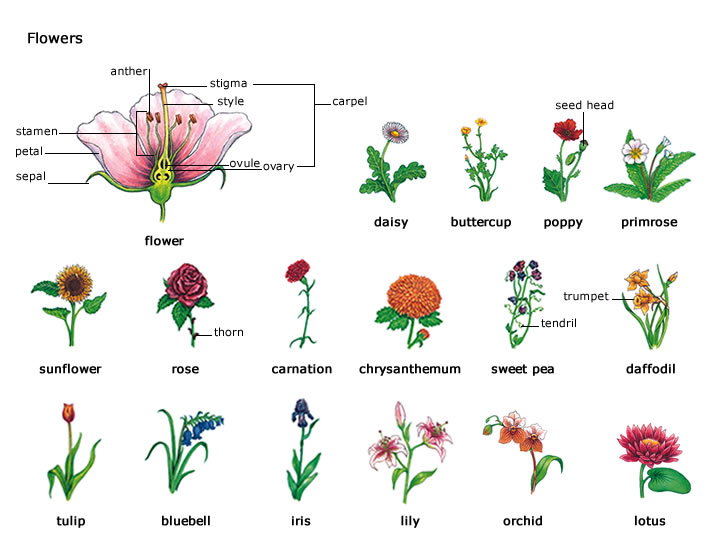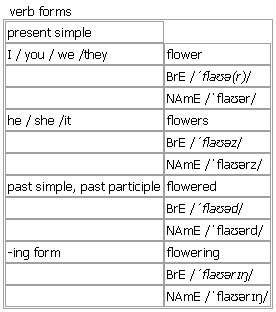|
Từ điển Oxford Advanced Learner 8th
 flower
flower

flower [flower flowers flowered flowering] noun, verb BrE [ˈflaʊə(r)] NAmE [ˈflaʊər]
noun 
1. the coloured part of a plant from which the seed or fruit develops. Flowers usually grow at the end of a ↑stem and last only a short time
• The plant has a beautiful bright red flower.
• The roses are in flower early this year.
•The crocuses are late coming into flower.
2. a plant grown for the beauty of its flowers
•a garden full of flowers
•a flower garden/show
3. a flower with its ↑stem that has been picked as a decoration
• I picked some flowers.
•a bunch of flowers
•a flower arrangement
see also ↑bouquet
Word Origin:
Middle English flour, from Old French flour, flor, from Latin flos, flor-. The original spelling was no longer in use by the late 17th cent. except in its specialized sense ‘ground grain’ (see ↑flour).
Collocations:
The living world
Animals
animals mate/breed/reproduce/feed (on sth)
fish/amphibians swim/spawn (= lay eggs)
birds fly/migrate/nest/sing
insects crawl/fly/bite/sting
insects/bees/locusts swarm
bees collect/gather nectar/pollen
spiders spin/weave a web
snakes/lizards shed their skins
bears/hedgehogs/frogs hibernate
insect larvae grow/develop/pupate
an egg/a chick/a larva hatches
attract/find/choose a mate
produce/release eggs/sperm
lay/fertilize/incubate/hatch eggs
inhabit a forest/a reef/the coast
mark/enter/defend (a) territory
stalk/hunt/capture/catch/kill prey
Plants and fungi
trees/plants grow/bloom/blossom/flower
a seed germinates/sprouts
leaves/buds/roots/shoots appear/develop/form
flower buds swell/open
a fungus grows/spreads/colonizes sth
pollinate/fertilize a flower/plant
produce/release/spread/disperse pollen/seeds/spores
produce/bear fruit
develop/grow/form roots/shoots/leaves
provide/supply/absorb/extract/release nutrients
perform/increase/reduce photosynthesis
Bacteria and viruses
bacteria/microbes/viruses grow/spread/multiply
bacteria/microbes live/thrive in/on sth
bacteria/microbes/viruses evolve/colonize sth/cause disease
bacteria break sth down/convert sth (into sth)
a virus enters/invades sth/the body
a virus mutates/evolves/replicates (itself)
be infected with/contaminated with/exposed to a new strain of a virus/drug-resistant bacteria
contain/carry/harbour (especially US) harbor bacteria/a virus
kill/destroy/eliminate harmful/deadly bacteria
Example Bank:
•He stopped to smell the flowers.
•He took her flowers and chocolates.
•I ordered flowers online for her birthday.
•I sent him flowers to apologize.
•I'm learning flower arranging.
•If the winter weather is mild, plants may come into flower too early.
•It has deep pink scented flowers.
•It was June and the roses were in flower.
•It was the first year that the cactus had produced flowers.
•The alleys were adorned with banks of flowers.
•The bush was absolutely covered in flowers.
•The flowers are pollinated by insects.
•The flowers were still tightly closed.
•The forest floor was a carpet of wild flowers.
•The park will have cherries in full flower this month.
•The spring flowers were just coming out.
•They sell a few pot plants, but they mainly sell cut flowers.
•What beautiful flowers!
•What lovely flowers!
•What time of year do daffodils flower?
Idiom: ↑flower of something
verb
1. intransitive (of a plant or tree)to produce flowers
Syn: ↑bloom
•This particular variety flowers in July.
•early-flowering spring bulbs
2. intransitive (literary)to develop and become successful
Syn: ↑blossom
Verb forms: 
Word Origin:
Middle English flour, from Old French flour, flor, from Latin flos, flor-. The original spelling was no longer in use by the late 17th cent. except in its specialized sense ‘ground grain’ (see ↑flour).
|
|
|
▼ Từ liên quan / Related words
Related search result for "flower"
|
|
